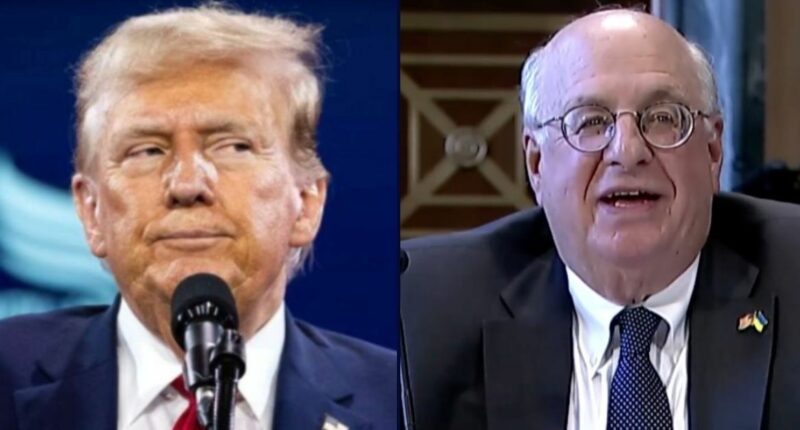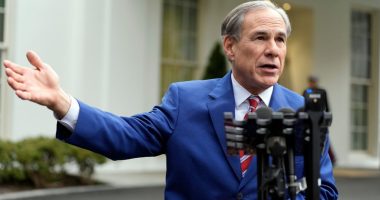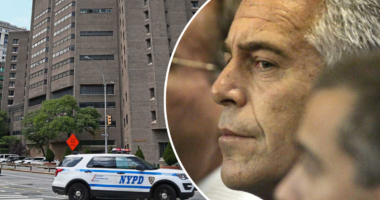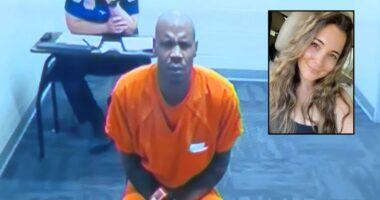Share this @internewscast.com
Left: Donald Trump speaks at the annual Road to Majority conference in Washington, D.C., in June 2024 (Allison Bailey/NurPhoto via AP). Right: U.S. District Judge Mark Wolfe delivering testimony to Senate Judiciary Subcommittee in 2023 (YouTube).
A federal judge in Massachusetts, appointed by Ronald Reagan, has stepped down from his lifetime position to voice his concerns about what he sees as significant failures and power abuses within the Trump administration.
Senior U.S. District Judge Mark L. Wolfe, who has served since his 1985 nomination, announced his resignation from the job he “loved” last Friday. Wolfe explained that he was driven to leave because he could “no longer endure the limitations on what judges can express publicly or do beyond the courtroom.”
In an op-ed for The Atlantic, Wolfe argued that “President Donald Trump is manipulating the law for partisan objectives, pursuing his opponents while shielding allies and donors from investigation and prosecution.” He emphasized that this approach contradicts the principles he upheld during his 50-year tenure with the Department of Justice and as a judge. Wolfe expressed that the White House’s disregard for the rule of law is profoundly troubling to him, making silence no longer an option.
Throughout his four decades on the bench, Wolfe oversaw numerous high-profile cases, including those involving notorious criminals like James “Whitey” Bulger and Stephen “Rifleman” Flemmi, along with their FBI handler. Wolfe asserts that his rulings were always grounded in the facts and legal principles, devoid of political bias, popularity considerations, or personal inclinations, as justice should be impartially administered to all.
Wolfe highlighted a series of grievances with Trump’s Justice Department, particularly the president’s tendency to target political adversaries through legal actions.
Within his op-ed, Wolfe pointed to Trump’s social media directives instructing Attorney General Pam Bondi to prosecute New York Attorney General Letitia James and former FBI Director James Comey as instances of prosecution efforts lacking adequate evidence. Wolfe noted that Trump’s appointee to lead the U.S. Attorney’s Office in Virginia, where James and Comey faced indictments, resigned after questioning the charges against Comey. Subsequently, this prosecutor was replaced by one of Trump’s past personal lawyers, though the legitimacy of her appointment remains under scrutiny.
On the other side of the coin, Wolfe also highlighted Trump’s penchant for shielding his donors and supporters from legal consequences. An especially egregious example of such an action, according to Wolfe, involved White House Executive Associate Director of Enforcement and Removal Operations Tom Homan:
In September of last year, Tom Homan, who became Trump’s “border czar,” reportedly was recorded accepting $50,000 in cash in return for a promise to use his potential future public position to benefit a company seeking government contracts. The FBI had created the fictitious company as part of an undercover investigation. Typically, an investigation of that sort would have continued after Homan became a Department of Homeland Security official, with the FBI seeking any additional evidence of bribery. However, after Trump took office, the investigation was shut down, with the White House claiming there was no “credible evidence” of criminal wrongdoing. Weeks after the FBI investigation was reported, Homan denied taking $50,000 “from anybody” and has said he did “nothing criminal.” An honest investigation could reveal who is telling the truth.
Noting that he’s been a senior judge since 2013 — meaning his resignation will not allow Trump to appoint another judge because his successor has already been appointed — Wolfe surmised that he could do more to uphold the law by speaking out against the current administration than by remaining on the bench.
He emphasized that his colleagues in the federal district courts throughout the nation have been “admirably deciding a variety of cases” generated by Trump’s “unprecedented actions,” and their work has effectively been negated by the U.S. Supreme Court at nearly every turn. The conservative bloc of justices, three of whom were appointed by Trump, have repeatedly removed injunctions and restraining orders issued by lower courts by deciding emergency motions through the court’s “shadow docket.” Such rulings typically include very little, if any, explanation for the court’s decision.
“I doubt that if I remained a judge I would fare any better than my colleagues,” Wolfe wrote.
Since Trump took office in January, the Supreme Court has issued 23 rulings via the shadow docket, with 20 of them going in favor of the administration, according to a tracking project from the Brennan Center.
“I resigned in order to speak out, support litigation, and work with other individuals and organizations dedicated to protecting the rule of law and American democracy. I also intend to advocate for the judges who cannot speak publicly for themselves,” Wolfe wrote. “Others who have held positions of authority, including former federal judges and ambassadors, have been opposing this government’s efforts to undermine the principled, impartial administration of justice and distort the free and fair functioning of American democracy. They have urged me to work with them. As much as I have treasured being a judge, I can now think of nothing more important than joining them, and doing everything in my power to combat today’s existential threat to democracy and the rule of law.”















